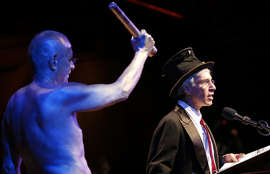
The Nobel Prize Ceremony at Harvard University
Moscow. September 13. INTERFAX.RU – Interfax and the popular science publication N + 1 have prepared a joint review of the main news of science, technology and technology over the past seven days.
– Lung cancer in non-smokers was divided into three subtypes according to the nature of the mutations. Lung cancer is considered a disease of smokers, but it occurs in 10-25 percent of cases in people who have never smoked. Understanding the nature of mutagenesis will allow the use of appropriate treatment approaches.
– An intrauterine device left for 20 years caused an abscess in a Japanese woman. She went to the hospital with complaints of fever and weight loss and abdominal pain. It turned out that the intrauterine device was surrounded by foci of purulent inflammation. The surgeons removed the abscesses and took out the coil, which was covered with a brown coating – as it turned out, a colony of bacteria Actinomyces israelii had grown on the contraceptive. The patient was prescribed intravenous antibacterial drugs and then in tablets. On average, IUDs need to be replaced every 3-5 years.
– The Australian paddle duck has learned human abuse. A male of the species Biziura lobata named Ripper, raised in captivity in the 1980s, learned to imitate the knock of a door and the phrase “you bloody fool”, and the second – the quack of the gray mallard duck Anas superciliosa . This is the first evidence that birds other than parrots and passerines mimic human speech and mechanical sounds. According to scientists, the unusual skills of lobed ducks are associated with their large brains by the standards of anseriformes and a stronger attachment than other ducks that arises between the ducklings and the mother – or the person who replaces her.
– A Danish amateur archaeologist found a large treasure of gold medallions 1,500 years old in Jutland. The treasure was buried near the small town of Jelling under the long house of a local chief in the 6th century AD. With the help of a metal detector, an aspiring archaeologist discovered 22 gold bracteate medallions in December 2020. Their total weight is 945 grams. The medallions are decorated with magical symbols, ancient runes, as well as images, including the god Odin and the Roman emperor Constantine the Great. It is one of the largest treasures in Danish history, dating back to the Germanic Iron Age.
– More and more Russian teams are joining the quantum computers race. The N + 1 website told what the Russian pursuers are striving for and how quantum computers are doing in general.
– The American magazine MIT Technology Review found out that Jeff Bezos and Yuri Milner (through a charitable foundation he founded with his wife Yulia) and possibly other large investors founded the company Altos Labs, which will study aging. Altos Labs is not the first company to take on the development of life-extension technology. N + 1 talked about what the richest man on the planet and his Russian partner have staked on and what can be expected from the stellar team of scientists they hired.
– On August 14, a small asteroid 2021 PJ1 flew past Earth. In this article, the N + 1 site has collected some of the most amazing portraits of small bodies in the solar system, created using planetary radar.
– The ceremony of awarding the Shnobel Prize this year again took place online. Read on to learn more about this year's laureates who have explored cat vocalizations, bacteria on chewing gum, corruption in politicians' BMIs, and more.

